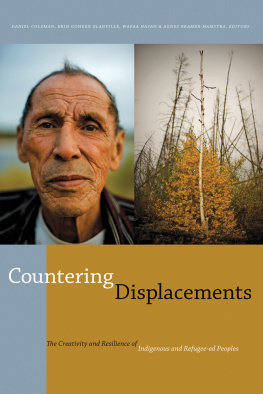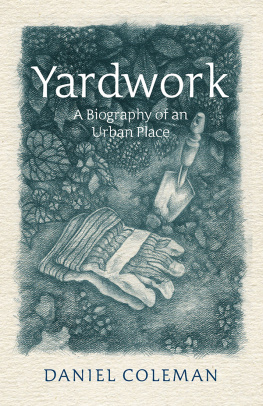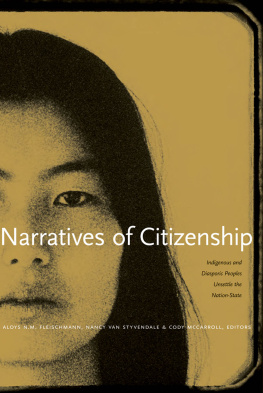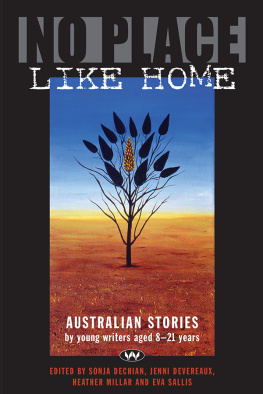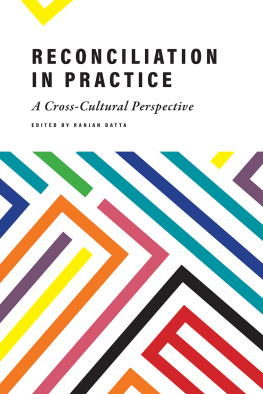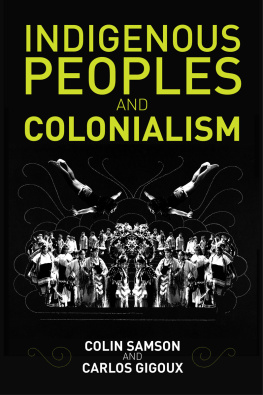
Published by
The University of Alberta Press
Ring House 2
Edmonton, Alberta, Canada T6G 2E1
www.uap.ualberta.ca
Copyright 2012 Daniel Coleman, Erin Goheen Glanville, Wafaa Hasan, Agnes Kramer-Hamstra
Library and Archives Canada Cataloguing in Publication
Countering displacements : the creativity and resilience of Indigenous and refugee-ed peoples / edited by Daniel Coleman ... [et al.]. 1st ed.
Includes bibliographical references and index.
Issued also in print.
ISBN 978-0-88864-607-1 (Epub)
1. RefugeesCross-cultural studies. 2. Indigenous peoplesCross-cultural studies. 3. Internally displaced personsCross-cultural studies. 4. Creation (Literary, artistic, etc.)Cross-cultural studies. 5. Resilience (Personality trait)Cross-cultural studies. I. Coleman, Daniel, 1961
JV6346.C69 2011 305.906914 C20119074389
Print edition ISBN 978-0-88864-592-0.
Index included in print edition.
First edition, first printing, 2012.
First electronic edition 2013.
Digital conversion by Transforma Pvt. Ltd.
Copyediting and proofreading by Joanne Muzak.
Maps by Wendy Johnson.
Indexing by Judy Dunlop.
Cover design by Alan Brownoff.
All rights reserved. No part of this publication may be produced, stored in a retrieval system, or transmitted in any form or by any means (electronic, mechanical, photocopying, recording, or otherwise) without prior written consent. Contact the University of Alberta Press for further details.
The University of Alberta Press gratefully acknowledges the support received for its publishing program from The Canada Council for the Arts. The University of Alberta Press also gratefully acknowledges the financial support of the Government of Canada through the Canada Book Fund (CBF) and the Government of Alberta through the Alberta Multimedia Development Fund (AMDF) for its publishing activities.
A Canada Research Chair Symposium for Diversity in Canadian Literary Cultures Project.

CONTENTS
Towards Lyric Re-presentations of the Alberta Oil Sands
JON GORDON
JEAN MCDONALD
MAZEN MASRI
Thtre du Public and Theater for Everybodys Les Murs Tombent, Les Mots Restent (Walls Fall, Words Live On)
CATHERINE GRAHAM
PAVITHRA NARAYANAN
A Saga of Self-Rehabilitation in West Bengal
SUBHASRI GHOSH
Mohawk Filmmaker Shelley Niros It Starts With a Whisper and Suite: INDIAN
AGNES KRAMER-HAMSTRA
MAROUSSIA HAJDUKOWSKI-AHMED
ACKNOWLEDGEMENTS
THIS PROJECT would not have been possible without the generous help of many people. Our thanks go, first and foremost, to conference presenters at the Displacements: Borders, Mobility, and Statelessness conference (March 2008) whose work inspired the themes of this book. Sincere thanks are also due to conference volunteers: Carolina Moulin Aguiar, Phanuel Antwi, Petronila Cleto, Karen Espiritu, Marnie Goheen, Mauroussia Hajdukowski-Ahmed, Nick Holmes, Emily Johansen, John Kirstein, Andy Kramer, Anna Kramer, Christine Lyons, Graeme MacQueen, Robert Miltner, Dilia Narduzzi, Sharlee Reimer, Anne Savage, Laura Wiebe Taylor, Lisa Vargas, and Riisa Walden.
Thanks also to the Department of English and Cultural Studies at McMaster University, particularly Antoinette Somo and Aurelia Gatto whose help was invaluable. Thanks to Department Chair, Mary OConnor, and James Erskine Taylor, of the Taylor family, for their warm words of welcome. The John Douglas Taylor fund and the Canada Research Chair for Diversity in Canadian Literary Culture provided essential financial support to make this project possible. We are grateful to the Filipina caregivers and the Salameh theatre troupe for generously volunteering their time to perform at the conference and for allowing us to post their performances in our online archives. A special thanks to The Pearl Company whose willingness to accommodate the conference when it had to move venues in the midst of a massive winter storm was key to its success.
We have benefitted from the help of many people in organizing and revising materials for the book and the website, especially Elizabeth Shultis, who edited and posted conference videos on the website; Lauren Murphy, who compiled an early version of the manuscript; and Elizabeth Jackson, who saw us through the editing stages of completing the manuscript. We are also grateful to the writers of the chapters in this volume. Without them, none of this would have been possible.
Wafaa would like to especially thank Omar for his unwavering and loving support and extend a gratitude to Nader, Suhair, Khaled, Wafa, Bessma, Riisa, Esmat, Mervat, and the Pearsons for their encouragement. Erin would like to thank the Goheen, Glanville, Goldsmith, and Groen families, and Mark, who together have provided a sense of place from which to work in the two continents she straddles. A motley assortment of people from Agness kin, including Fran, Shirl, Sara Ann, as well as Marvin, MaryLou, Debbie, Linda, Shirley, June, Sheila, Nan, and Andy: I am so grateful for the ways each of you consciously and without knowing, spurred me on. Daniel offers his thanks to Wendy, whose love makes solid ground.
INTRODUCTION
Prefatory Remarks
THE CHAPTERS gathered in Countering Displacements: The Creativity and Resilience of Indigenous and Refugee-ed Peoples highlight the creativity and agency of people who have been displaced. Each author, addressing a distinct case study of displacement, points to the ways in which the experience of displacement and the possibilities and realities of resilience are creatively expressed in the cultural domain. The relationship between indigenous and refugee-ed experiences of displacement and of agency is directly addressed in a number of the following eight chapters and is further opened up by the conversation offered amongst the chapters. Contexts of study range from the Americas to the Middle East and the Indian subcontinent.
The volume begins with two foundational articles. The first introduces creative acts of narration as a form of agency, and the second offers a theorization of creative acts of citizenship. Jon Gordons Displacing Oil: Towards Lyric Re-presentations of the Alberta Oil Sands explores the literal displacement of the earth under our feet (as in the stripping away of land in the Alberta oil sands project) and that processs eventual displacement of indigenous people. Displacement, here, is uniquely extrapolated from its anthropocentric assumption and is instead situated within a complex relationship amongst land, ecosystem, economy, and human experience. His essay reminds us that human displacements are fundamentally about removal of and from the land. And, by showing how creative lyric and literary expression have been used to protest the oil sands project, Gordon draws our attention to the way displacement is often countered in cultural forms. The essay that follows, Jean McDonalds Citizenship Studies and Migrant Illegality, parallels Gordons topographical groundwork by providing a theoretical grounding for the volume in her literature review of citizenship studies. Her essay familiarizes our readers with the conversations in international relations regarding nation-state sovereignty. McDonalds focus on the work of No One Is Illegal illustrates how those who are excluded from statehood and citizenship can creatively express their protest and, by taking up their own assertions of citizenship, erase clearly defined lines between insiders and outsiders.
Next page
